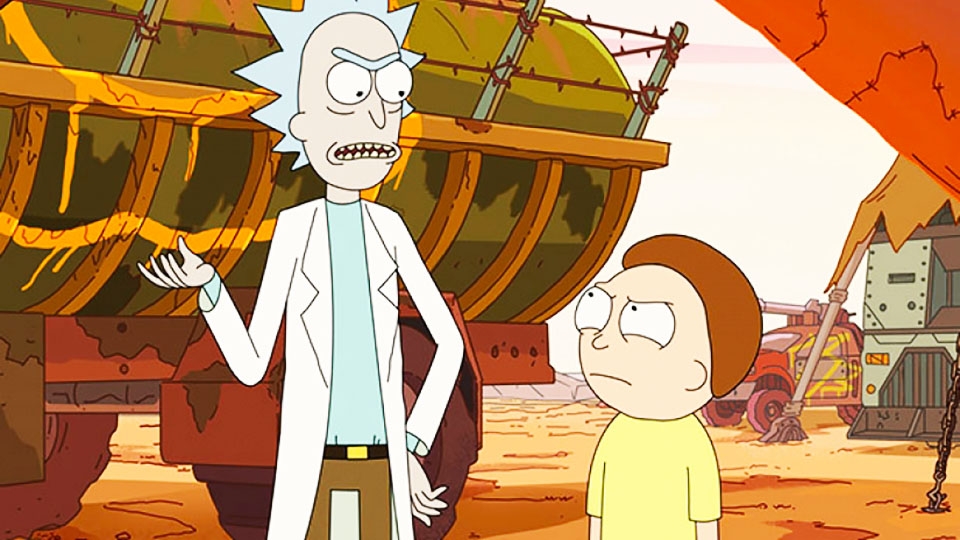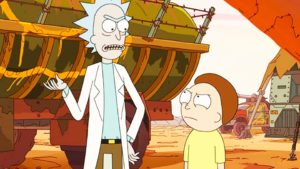

The third season of ‘Rick and Morty’ actually premiered as an unannounced April Fool’s joke. The season did not begin in earnest until July 30 with the episode “Rickmancing the Stone.”
By Zach Landau | A&E Editor
10/05/17
So, Rick and Morty. Rick. And Morty. Together. 100 times forever Rick and Morty.
Truth be told, I don’t know what to say about the third season of what is undoubtedly the strangest, most fantastical show on TV now. What can be best be described as part Futurama spin-off, part Back to the Future parody, part crash course on existential philosophy and theoretical physics, Rick and Morty has always coddled next to the weird and unpredictable.
Each episode includes its own cosmic gimmick, and adventures for the titular heroes revolve around solving fantastic problems with equally fantastic, even bizarre solutions. Anatomy theme parks. An interplanetary talent show. Psychic parasites. All types of strange, wonderful elements come together to form a miasma of comedy and tragedy. Sure, it’s funny to watch dogs gain sentience and take over the world, but what separates Rick and Morty is its commitment to seeing the joke through to its twisted end.
Dogs may take over the world, sure, but they also keep Morty as a pet and demonstrate a level of sophistication that is beyond that of even humans. It’s trite, in truth. However, while most other shows may stop at “dogs take over” or try to parody the trope, Rick and Morty commits to the idea with full sincerity, making the ending where the dogs leave to another dimension all the more surreal and funny.
It’s a refreshing take on animated comedy to have something so sincere and yet so nihilistic. The commitment to form allows the writers to pack in tons of jokes, but it also allows for the show’s darker elements to shine through.
The futility of human life, for example, is a recurring motif throughout the series. To someone as smart as Rick, the only life that matters is his own. Death, destruction and bedlam are the costs of science, and his indifference to the wider implications of his actions makes Rick the most dangerous agent in his universe.
That unfettered chaos does have consequences, however, and that’s where Season 3 comes in. In the past, the show happily leaves trauma and grief as ancillary to the main plot. This season, though, brings those elements to the forefront. These extra details add texture and nuance to an already dense show. Anyone can watch an episode and appreciate it for its basic comedic value, but for those who commit themselves to analyzing a bit further, there’s an extra bit of ethos to consume and examine.
There’s so much that goes into one episode, but no individual part stands out as abnormal or noteworthy. That is, until Season 3, where most episodes make their purpose and elements clear from the onset. The open and tacit nature of this outing removes much of the charm and excitement that made the series such a joy to watch. Rick and Morty is still as anarchic as before, but this season more than others brings its subtext to the forefront.
In the second episode of the season, for example, Rick, Morty and Summer all find their methods of coping with Jerry and Beth’s divorce in a Mad Max-esque world. Right from the start, all the pieces are carefully put into place for character arcs that telegraph themselves the moment the opening credits end. And this pattern repeats itself throughout the season, so much so that the writers even mock the idea in episode five when Rick breaks the fourth wall, screaming, “It’s a Rick and Jerry adventure! Rick and Jerry episode!”
And that’s lazy. I hate to say it, but it is kind of lazy to mock the fact that each episode feels the same and to act like that’s OK. Because it’s not. Pointing out a problem with one’s work does not mean that problem goes away, and we expect better from the show’s writers.
That’s the reason it’s hard to attribute this bizarre instance to laziness. There is a lot of effort put into this season. The writing is still top-notch, there’s rarely a joke that doesn’t land and the animation has even had a clear step up since Season 1. The bits of character growth are also stellar, and the therapist’s monologue at the end of “Pickle Rick” will be forever remembered for its excellent delivery and razor-sharp writing.
That being said, watching Rick and Morty does get boring when what was a cool detail that rewarded fans for digging deeper becomes the main vehicle for seven episodes in a 10-episode season. Individual character’s motives, their personal struggles, them as people instead of archetypes, marks a bizarre switch from the simple caricatures that they once were. References to internal struggles were typically resolved at the end of episodes, and the notion that there was a continuity of emotional depth was more-or-less a foreign element in the series.
This is all to say that Rick and Morty is still really good, perhaps even a paragon in its genre. However, the re-emphasis on longer character arcs instead of immediate, gratifying comedy drags down what would have been an exceptional season. Perhaps if these episodes were spaced out more (most development-heavy ones occur toward the beginning of the season), then there would be a more natural flow. The front-loading gives the impression that there will be a massive season culmination where all these elements come together, but that never arrives. As is, Season 3 of Rick and Morty left me rather cold, as I greeted each new episode with the worry that we would never move past the quagmire of its opening. Here’s to hoping for a return to form in, I don’t know, a year and a half.



